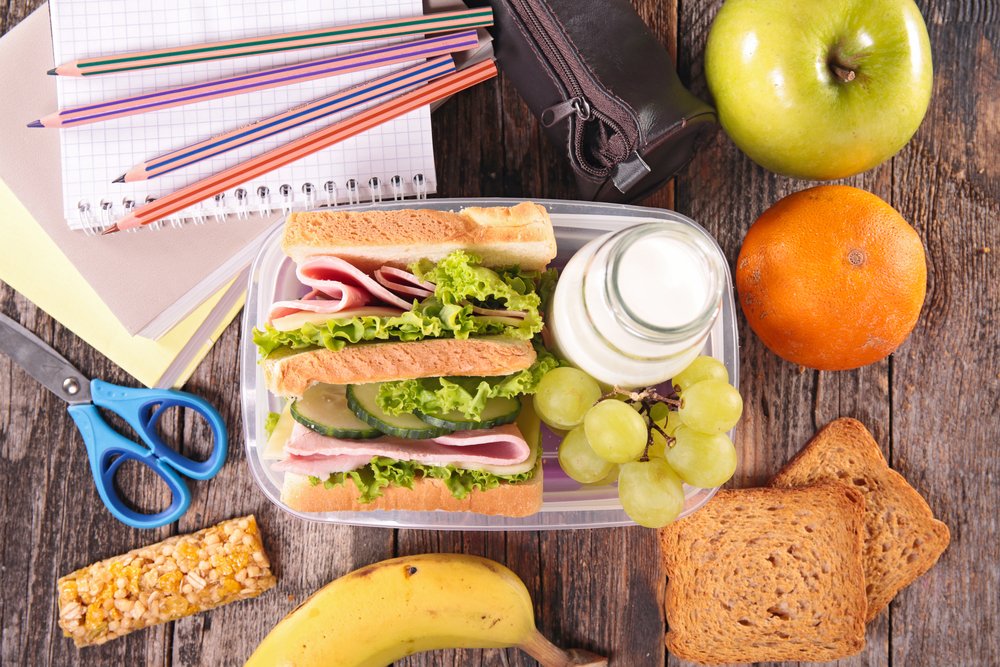A well fed brain is more likely to lead to good mood, behaviour and learning.

(Photo Credit PENNUTRITION https://twitter.com/pennutrition)
Nutrition is important for the brain as well as the body. As the school year is off to a start, we reviewed a research summary on diet, behaviour and learning in children. Here are our top 3 tips for unlocking food’s potential to support your child’s learning. The key areas of focus are the overall nutritional balance of regularly timed meals, and adequate intake of some essential nutrients, including omega-3 fatty acids.
- Mind the overall nutritional balance!
Enjoying a variety of foods help the body and the brain get what they need to function best. The brains and bodies of children need a regular supply of energy so that they can think effectively. Studies show that most children would benefit from more fruit and vegetables, and fewer sugary drinks, high-fat and high-sugar snacks. Although the brain prefers glucose (sugars) for energy, in the long run it doesn’t cope well with major swings in blood sugar. Emerging evidence shows that foods that are digested more slowly and provide long lasting energy may be better choices.
DIETITIAN’S TIP: To moderate blood sugar swings, choose whole grains more often, and balance carbohydrate intake with some protein in each meal.
- Eat regularly – especially breakfast.
When children go without food for too long they may lose concentration and / or they may get in a bad mood. Researchers find that eating breakfast leads to better learning compared to skipping breakfast. Encourage your kids to eat breakfast. Any breakfast or lunch meal is better than nothing, however including some fibre and protein in your child’s breakfast (and lunch) may be helpful for the brain.
DIETITIAN’S TIP: Try some of these great breakfast ideas:
- A boiled egg with wholegrain toast and sliced peppers or tomato
- Cooked oats or other whole grain cereal with milk and a sliced apple or banana
- Yogurt berry smoothie with nuts and seeds
- Eat a variety of foods to get key nutrient for the brain.
One of the most important areas of research into the relationship between foods and brain health focuses on oily fish that are rich in omega-3 fats. There is also some evidence that omega-3 fats help with attention. Iron, zinc and magnesium are also thought to be particularly important for the brain. Low iron levels are strongly linked to poor mood and concentration. Low magnesium may be linked to anxiety, and low zinc may lead to poor attention and poor sleep.
Oily fish is the best source of omega-3 fats. Red meat, poultry and pulses (beans, peas, lentils, chickpeas) are examples of good sources of iron and zinc. Green vegetables, nuts and seeds are all a good source of magnesium. For some children who are not getting enough, increasing their intake of foods containing one or more of these nutrients could make a difference to their mood, behaviour and learning. Talk to a dietitian if you’re concerned about these nutrients for your child.
DIETITIAN’S TIP: A varied and nutritious diet is the most reliable way to help your child’s developing brain and body get the nutrients it needs. Children (and adults) should eat two servings of fatty fish a week. Choose fish high in omega-3 fatty acids like salmon, mackerel, sardines or herring. Plant based sources of Omega-3 include enriched eggs, walnuts & flaxseeds.
Bottom line: Giving your child regular meals and a healthy, well-balanced diet helps their development, mental well-being and physical health. Your child might also benefit from reducing their intake of foods that are low in nutritional value. If you have questions, or for more information contact us or a Resisted Dietitian in your community. Factsheets on selected topics are also available on Dietitians of Canada website.
Reference: BDA The Association of UK Dietitians, Food Fact Sheet 2017. Source PENNUTRTITION.